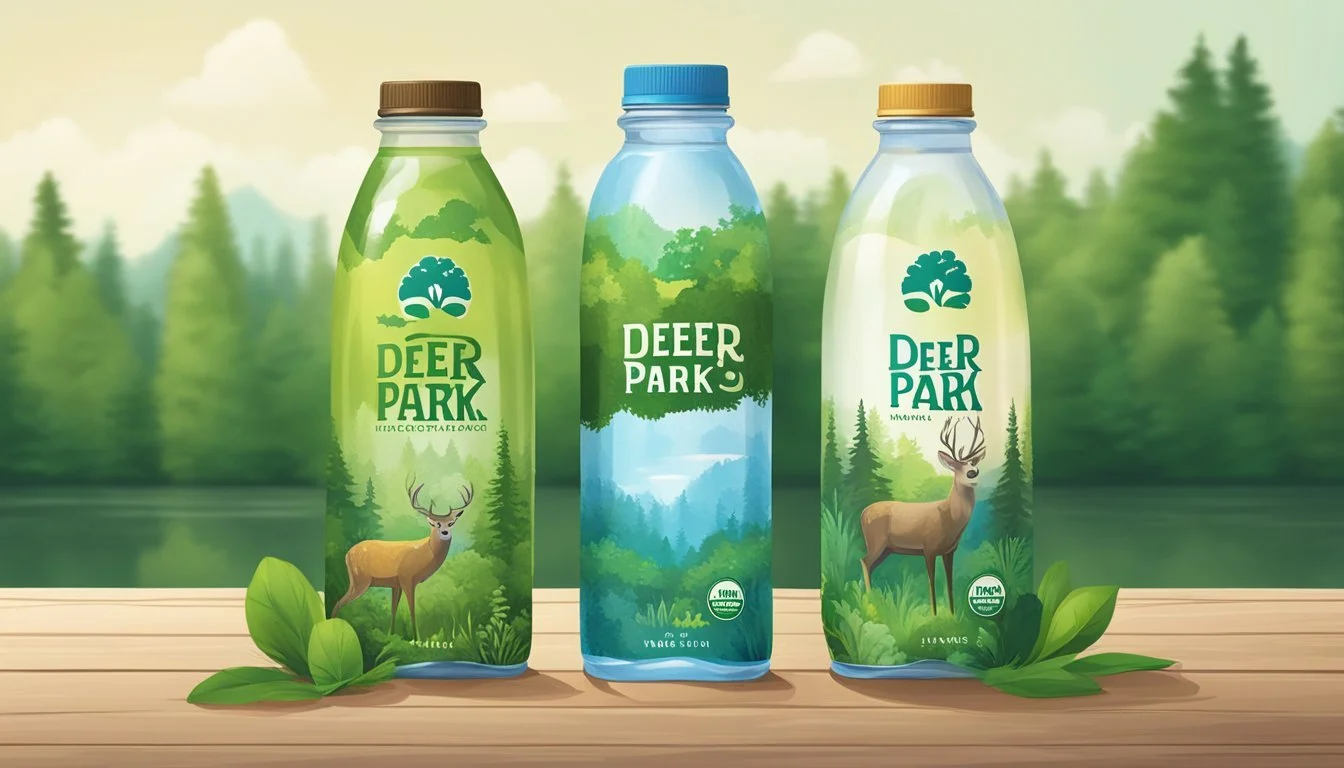Deer Park vs. Whole Foods 365
Comparing the Best Bottled Water
When it comes to choosing the best bottled water, consumers often find themselves debating between popular brands like Deer Park and Whole Foods 365. Each has its own distinct characteristics and qualities that appeal to different tastes and preferences. This examination will help discerning customers make an informed choice based on taste, safety, and overall quality.
Deer Park, known for sourcing its water from springs across the eastern United States, prides itself on providing 100% natural spring water with a crisp and refreshing taste. Deer Park's loyal consumer base often highlights its clean flavor and reliable quality as key reasons for their preference. In contrast, Whole Foods 365 offers a spring water option that has been noted to taste like more average purified waters, according to some reviews.
Whole Foods 365, available at an economical price point, caters to budget-conscious consumers looking for an everyday bottled water option. Although some may find its taste somewhat lacking compared to premium brands, its affordability cannot be ignored. Both brands have been under scrutiny for PFAS levels, with Whole Foods 365 and Deer Park showing relatively low levels but still attracting attention from health-conscious consumers.
Evaluating Bottled Water
When comparing Deer Park and Whole Foods 365 bottled waters, it's essential to consider the source, quality, and safety standards of each brand. These factors influence the taste and reliability of the water you consume.
The Significance of Source
The origin of bottled water affects its taste and quality. Deer Park sources its water from multiple springs across the eastern United States, offering 100% natural spring water.
Whole Foods 365 sources water from protected springs, ensuring it is free of contaminants. Understanding the water source helps consumers trust the product they are drinking.
Quality and Safety Standards
Quality and safety are paramount when choosing bottled water. The EPA (Environmental Protection Agency) and FDA (Food and Drug Administration) regulate drinking water quality.
Deer Park maintains rigorous safety standards, adhering to both EPA and FDA guidelines. Periodic testing ensures the absence of harmful contaminants like PFAS chemicals. Whole Foods 365 similarly follows strict safety protocols, ensuring the water is safe for consumption.
Water Brand Profiles
Deer Park boasts a crisp taste, attributed to its sourcing from multiple natural springs. It has a longstanding reputation for quality and is preferred for its natural spring origins.
Whole Foods 365 offers spring water with a focus on being contaminant-free and maintaining high standards of purity. It is preferred for its straightforward sourcing information, backed by the trusted Whole Foods brand.
Each brand holds its unique strengths, making them popular choices for consumers seeking reliable and safe hydration options.
Health and Environmental Considerations
Choosing between Deer Park and Whole Foods 365 involves weighing health impacts and environmental effects. Consumers should consider contaminants, packaging, and regulatory oversight of these bottled waters.
Health Aspects of Different Waters
Deer Park and Whole Foods 365 undergo different sourcing and purification processes. Deer Park claims its water is 100% natural spring water, providing essential electrolytes. Whole Foods 365, another spring water option, has faced criticism, particularly for its sour taste and dry aftertaste.
Both brands have been included in Consumer Reports' investigations regarding PFAS chemicals, though Deer Park was notably mentioned for its slightly higher levels. These contaminants can pose health risks, including cancer. Consumers need to be aware of possible long-term exposure to such PFAS chemicals through regular consumption.
The Impact of Packaging on the Environment
Packaging plays a significant role in the environmental impact of bottled water. Deer Park and Whole Foods 365 both use plastic bottles, which contribute to sustainability concerns due to the long decomposition time of plastic waste.
Deer Park takes measures such as using recycled plastic in their bottles. Whole Foods 365 also claims eco-friendly practices, yet the intense scrutiny remains on the overall waste generated. Consumers should consider not only the contents of the bottle but also the environmental footprint left by discarded packaging.
Regulatory Oversight and Safety
Regulatory standards for bottled water are set by entities like the EPA and FDA. For PFAS chemicals, the EPA has an advised limit of 70 parts per trillion (ppt) for PFOA and PFOS.
While both Deer Park and Whole Foods 365 must comply with these guidelines, it is essential that consumers remain informed about current findings and testing results. Contaminants in drinking water, such as lead, are also under constant review to ensure public health and safe drinking water standards.
Maintaining transparency and strict regulatory oversight helps ensure the safety and quality of both Deer Park and Whole Foods 365 bottled water.
Consumer Experience
Deer Park and Whole Foods 365 bottled waters offer distinct consumer experiences characterized by their taste profiles and their roles in daily hydration.
Taste and Flavor Profiles
Deer Park prides itself on a tradition of sourcing from multiple springs across the eastern United States. This approach is believed to contribute to its recognized crisp, clean taste that many consumers appreciate. The flavor profile is often described as refreshing without any detectable aftertaste, making it a favorite for those seeking a natural spring water experience.
Whole Foods 365, categorized as a spring water, presents a different taste. Consumer Reports and reviews highlight its slightly sour and dry aftertaste. This sensory profile might not appeal to everyone. However, it offers a unique option for those looking for a distinct flavor in their hydration routine. Some consumers find the taste to be less appealing compared to Deer Park.
The Role of Water Brands in Hydration
Deer Park positions itself as a reliable source of hydration, leveraging its natural spring origins to assure purity and quality. Consumers often regard it as an excellent everyday water choice due to its crisp taste and lack of any unpleasant aftertaste. The brand's commitment to sourcing from natural springs adds an extra level of trust and may enhance the perceived health benefits.
Whole Foods 365, while offering affordability, occupies a different segment. The taste and flavor profile might not be the primary draw; rather, the focus may be on the brand's accessibility and convenience. Its market position as an economical choice can make it a practical option for budget-conscious consumers looking for a functional hydration solution without prioritizing taste. The packaging and price point of Whole Foods 365 water might be seen as more pragmatic.
Industry and Market Insights
The bottled water industry is a sprawling market with numerous companies competing for consumer preference. Key players like Nestlé and Coca-Cola influence market dynamics, while economic factors and corporate practices impact consumer choice.
Major Companies and Market Share
Nestlé and Coca-Cola dominate the bottled water market, with flagship brands like Nestlé Pure Life and Dasani. Deer Park, owned by Nestlé, and Whole Foods 365 are notable contenders in the spring water segment.
Whole Foods 365 caters to a niche market focused on organic and natural products. While Deer Park boasts an extensive distribution network, Whole Foods 365 leverages its parent company's retail stores to reach health-conscious consumers.
Economic Factors and Consumer Choice
Economic conditions directly influence bottled water sales. During economic downturns, consumers may opt for cheaper alternatives or tap water. Legal limits on contaminants, including PFAS levels, play a crucial role in shaping consumer trust and preferences.
Corporate malfeasance in the industry, such as Nestlé's history of over-extraction concerns, can sway public opinion. Consumers are increasingly aware of environmental impacts, which prompts companies to adopt sustainable practices. Adherence to International Bottled Water Association guidelines is crucial for maintaining consumer trust.
Comparative Analysis
Deer Park and Whole Foods 365 offer bottled water that varies significantly in origin, purity, and safety standards. Comparing these aspects will help determine which brand best suits consumer needs.
Deer Park vs. Whole Foods 365 Direct Comparison
Origin and Purity:
Deer Park sources its water from springs across the eastern United States. It prides itself on providing 100% natural spring water known for a crisp taste. Whole Foods 365, on the other hand, sources its water from various springs, though specific origins are less transparent.
Mineral Content:
Deer Park’s water is known for its balanced mineral content which enhances its clean taste. Whole Foods 365 also includes a moderate level of minerals, contributing to its pure and fresh flavor.
Safety:
Deer Park reported low levels of PFAS, well within safety standards. Whole Foods 365 has also adhered to safety regulations, but recent reports cited the presence of minimal PFAS levels, raising slight consumer concerns.
Packaging and Price:
Deer Park typically uses eco-friendly packaging, aligning with an environmental commitment. Whole Foods 365 employs similar sustainable practices. Price-wise, Whole Foods 365 tends to be slightly more economical compared to Deer Park.
Competitor Brand Considerations
Poland Spring and Fiji:
Both brands are recognized for their high purity and balanced mineral content. Poland Spring's origin is from the untouched regions of Maine, whereas Fiji's artesian water comes from tropical Fiji islands. These brands offer premium quality but are often priced higher.
Dasani and Aquafina:
These brands provide purified water by reverse osmosis. While not spring water, they maintain high safety standards. Price-wise, they are more accessible but may lack the natural taste of spring water.
Consumers may weigh the origin, purity, and safety of Deer Park and Whole Foods 365 against these competitors to make informed choices.
Conclusion
When comparing Deer Park and Whole Foods 365 bottled waters, several factors come into play, including taste, safety, and overall quality.
Taste
Deer Park offers a crisp and refreshing taste derived from natural spring sources.
Whole Foods 365, despite being a spring water, has been noted for having a more average and sour taste.
Safety
Consumer Reports found toxic PFAS chemicals in several bottled water brands. Deer Park was mentioned in the report, whereas Whole Foods 365 is also under scrutiny for safety but specific mention of PFAS was not found.
Price
Deer Park is competitively priced and widely available.
Whole Foods 365 tends to be budget-friendly but may compromise on taste quality.
Preferred Brand
The choice between Deer Park and Whole Foods 365 often depends on individual needs and preferences.
If taste and natural sourcing are a priority, Deer Park might be the preferred brand.
For those looking for cost-effectiveness, Whole Foods 365 could be a suitable option.
Final Thoughts
Both brands have their pros and cons. The bottom line is that your decision should align with your personal preferences and priorities, whether that be taste, safety, or cost.
More About Deer Park
Deer Park vs Cascade Mountain: Which Bottled Water is Better?
Deer Park vs Hawaii Volcanic: Which Bottled Water is Better?
Deer Park vs Hawaiian Springs: Which Bottled Water is Better?
Deer Park vs Icelandic Glacial: Which Bottled Water is Better?
Deer Park vs Kirkland Signature: Which Bottled Water is Better?
Deer Park vs Mountain Valley Spring Water: Which Bottled Water is Better?
Deer Park vs Nestle Pure Life: Which Bottled Water is Better?
Deer Park vs Richard's Rainwater: Which Bottled Water is Better?
Deer Park vs Solan de Cabras: Which Bottled Water is Better?
Deer Park vs Talking Rain AQA: Which Bottled Water is Better?
Deer Park vs Whole Foods Italian Still Mineral water: Which Bottled Water is Better?
More About Whole Foods 365
Acqua Pana vs Whole Foods 365: Which Bottled Water is Better?
Alkaline88 vs Whole Foods 365: Which Bottled Water is Better?
Antipodes vs Whole Foods 365: Which Bottled Water is Better?
Aqua Carpatica vs Whole Foods 365: Which Bottled Water is Better?
Arrowhead vs Whole Foods 365: Which Bottled Water is Better?
Big Chill vs Whole Foods 365: Which Bottled Water is Better?
Boxed Water vs Whole Foods 365: Which Bottled Water is Better?
Cascade Mountain vs Whole Foods 365: Which Bottled Water is Better?
Castle Rock vs Whole Foods 365: Which Bottled Water is Better?
Core Hydration vs Whole Foods 365: Which Bottled Water is Better?
Crystal Geyser vs Whole Foods 365: Which Bottled Water is Better?
Hawaii Volcanic vs Whole Foods 365: Which Bottled Water is Better?
Hawaiian Springs vs Whole Foods 365: Which Bottled Water is Better?
Ice Mountain vs Whole Foods 365: Which Bottled Water is Better?
Icelandic Glacial vs Whole Foods 365: Which Bottled Water is Better?
Just Water vs Whole Foods 365: Which Bottled Water is Better?
Liquid Death vs Whole Foods 365: Which Bottled Water is Better?
Mountain Valley Spring Water vs Whole Foods 365: Which Bottled Water is Better?
Nestle Pure Life vs Whole Foods 365: Which Bottled Water is Better?
Open Water vs Whole Foods 365: Which Bottled Water is Better?
Poland Spring vs Whole Foods 365: Which Bottled Water is Better?
Pure Life vs Whole Foods 365: Which Bottled Water is Better?
Purely Sedona vs Whole Foods 365: Which Bottled Water is Better?
Richard's Rainwater vs Whole Foods 365: Which Bottled Water is Better?
San Pellegrino vs Whole Foods 365: Which Bottled Water is Better?
Simple Truth vs Whole Foods 365: Which Bottled Water is Better?
Smartwater vs Whole Foods 365: Which Bottled Water is Better?
Solan de Cabras vs Whole Foods 365: Which Bottled Water is Better?
Talking Rain AQA vs Whole Foods 365: Which Bottled Water is Better?
Topo Chico vs Whole Foods 365: Which Bottled Water is Better?
Weird Water vs Whole Foods 365: Which Bottled Water is Better?
Whole Foods 365 vs 1907water: Which Bottled Water is Better?
Whole Foods 365 vs BodyArmor: Which Bottled Water is Better?
Whole Foods 365 vs CBD Living: Which Bottled Water is Better?
Whole Foods 365 vs Crystal Lake: Which Bottled Water is Better?
Whole Foods 365 vs Essence pH10: Which Bottled Water is Better?
Whole Foods 365 vs Kirkland Signature: Which Bottled Water is Better?
Whole Foods 365 vs Proud Source: Which Bottled Water is Better?
Whole Foods Italian Still Mineral water vs Whole Foods 365: Which Bottled Water is Better?
Zephyrhills vs Whole Foods 365: Which Bottled Water is Better?







